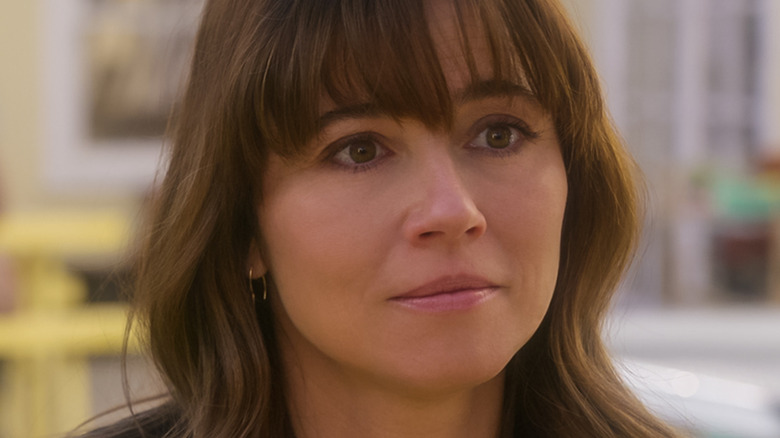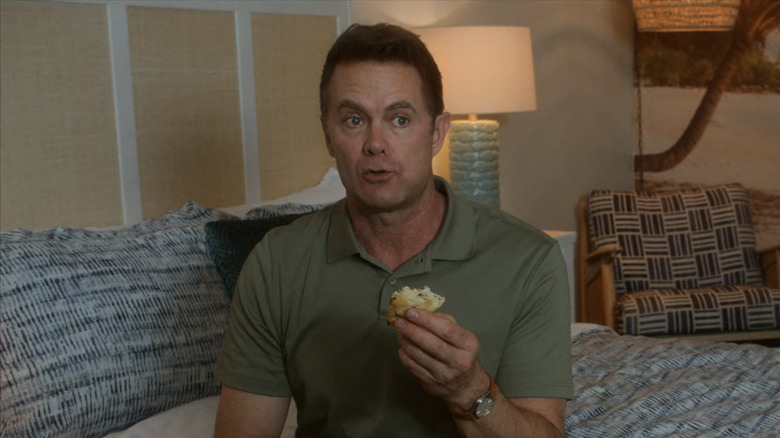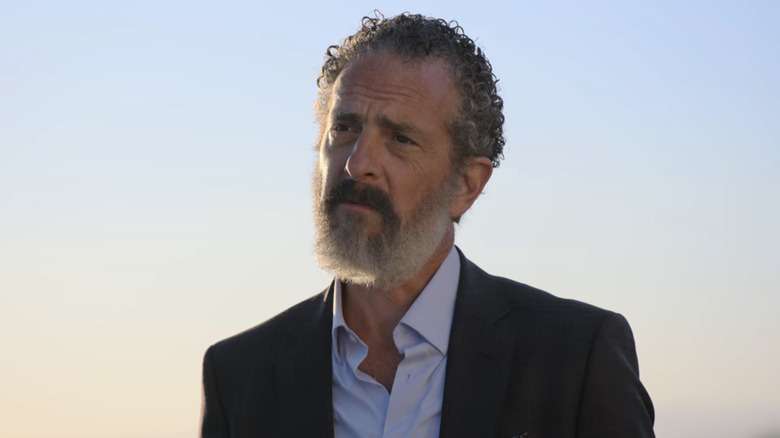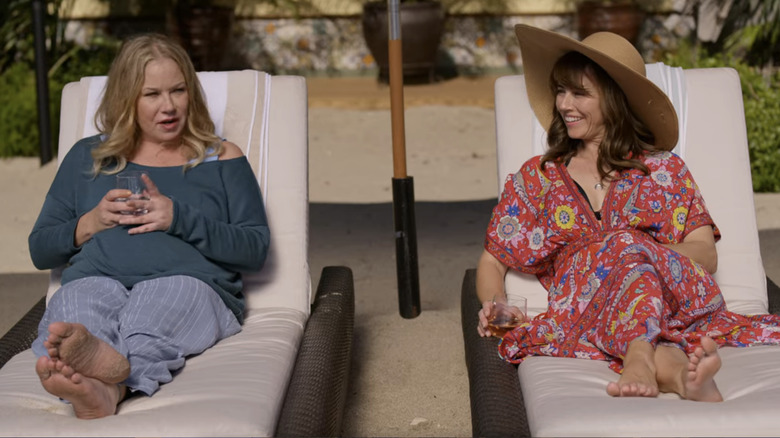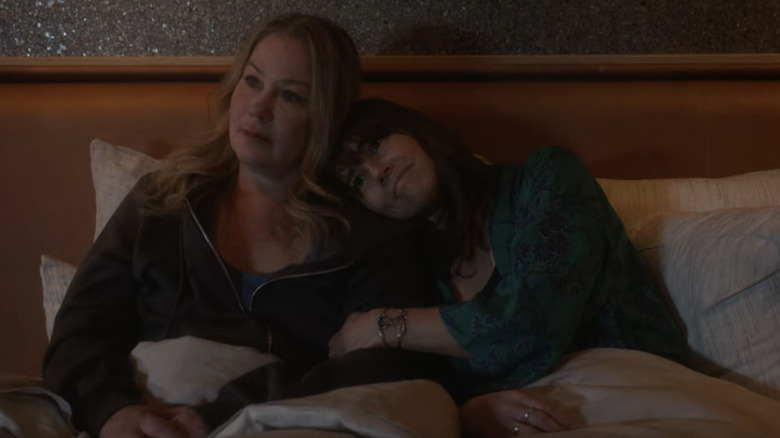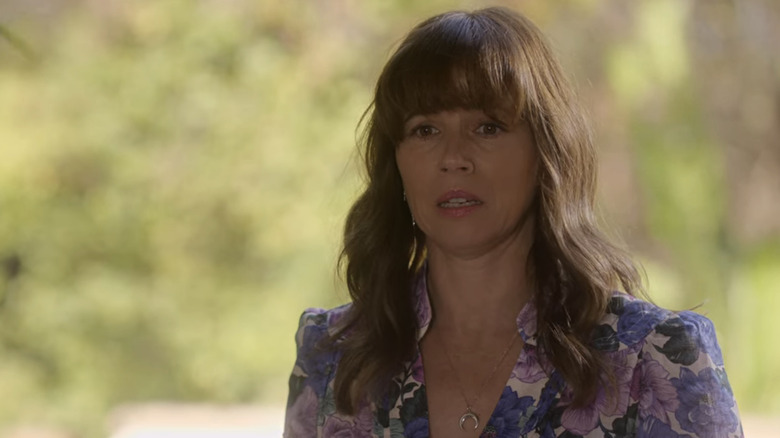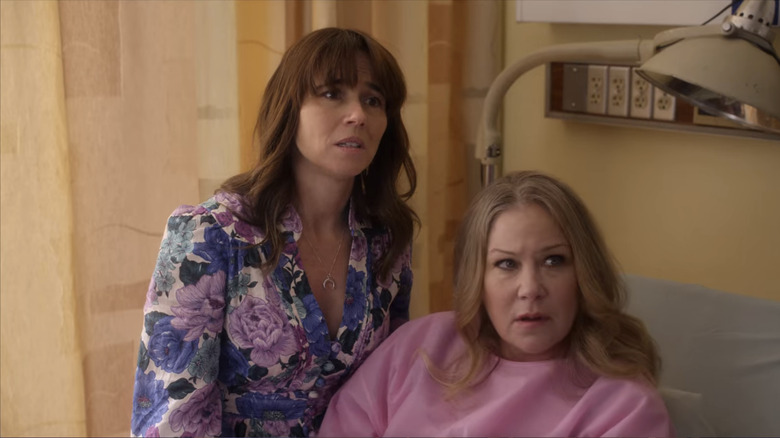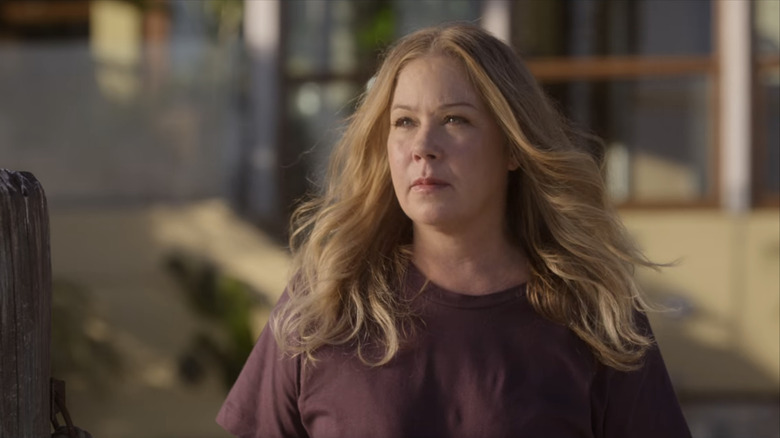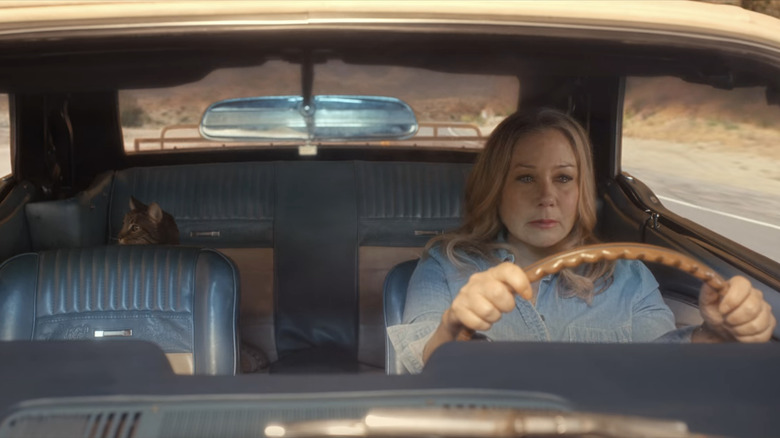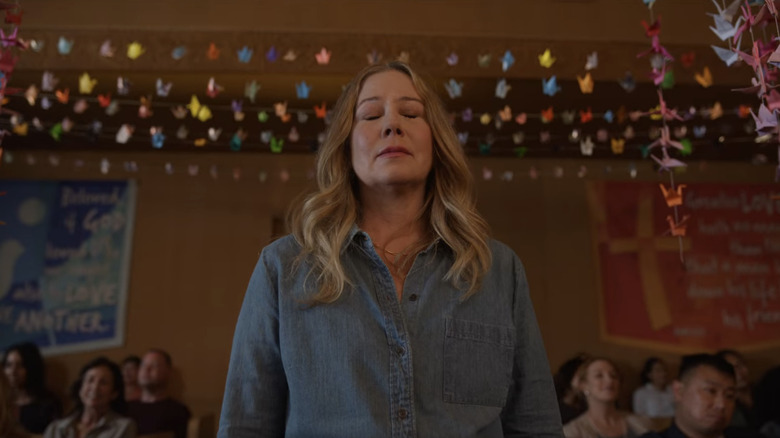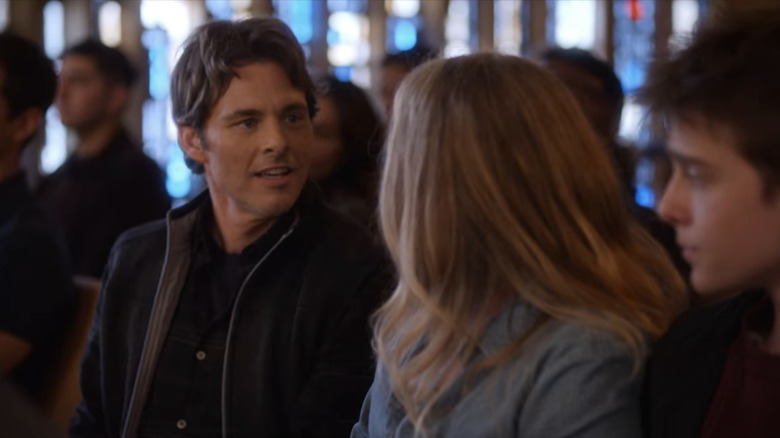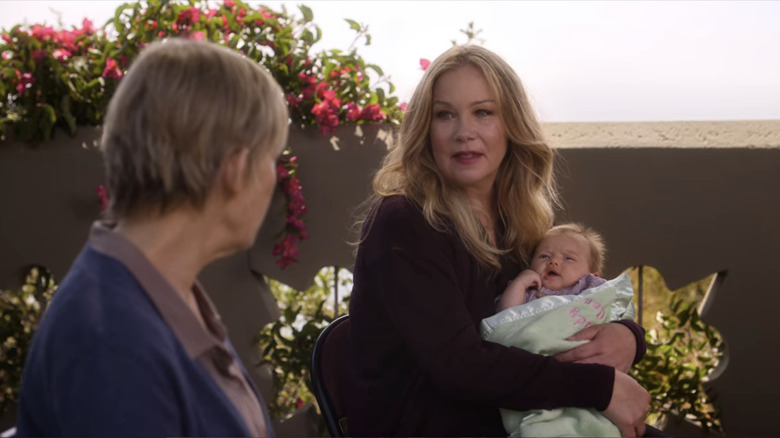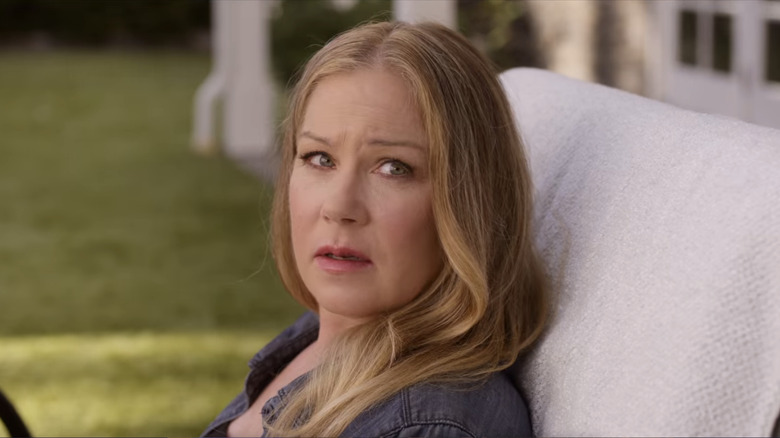The Ending Of Dead To Me Season 3 Explained
Netflix's "Dead to Me" has always felt like two shows in one. Created by Liz Feldman and produced by Adam McKay and Will Ferrell, the series started as a portrait of the unlikely friendship between brittle, Type-A Jen (Christina Applegate) and hippie-dippie Judy (Linda Cardellini), two women with nothing in common but the shared grief of being recently widowed. But before the premiere episode ends, the audience is thrown a curveball: Judy is not a widow, and she and her abusive ex-fiancé Steve Wood (James Marsden) are responsible for the death of Jen's husband. The perceptive comedy-drama is now also a mystery and at times a grisly crime drama, and through the show's three-season run those genres did not always sit comfortably together, despite the always excellent work put in by Applegate, Cardellini, and Marsden, who returned after Steve's death at the end of Season 1 as Steve's goofball identical twin Ben.
When the third and final season premiered in November 2022, more than two years after Season 2, the mystery elements remained, though the show's focus was clearly on the relationship between Jen and Judy as both women were dealt major life changes: a terminal cancer diagnosis for Judy and a surprise pregnancy for Jen. For the final episode, Feldman sets nearly every character aside and focuses on these two women, luxuriating one last time in the actors' ace comic chemistry — with a loose end or two still blowing in the wind like an origami crane. Let's take a look at the ending of "Dead to Me" Season 3.
Who killed Agent Moranis?
Season 3 introduces Garret Dillahunt as FBI agent Glen Moranis, an apparently dogged and brilliant investigator who takes over the Steve Wood murder case after Steve's body is found buried in a national park (where Jen and Judy buried him in Season 2). For the most part, he lingers in the background, the other shoe waiting to drop. When Jen thinks he took one of her coffee mugs in order to match her DNA to some that was found on Steve's body, her first troubling instinct is to kill him by spiking a batch of scones with pain pills. That moment is a false alarm, but in Episode 8, when it turns out that he did get her DNA from a thrown-away water bottle, Jen shows up at his hotel room with a batch of freshly made scones. By the end of the next episode, he's dead.
Coincidence? In Episode 10, we hear that the FBI has pinned both Steve and Moranis' death on the Greek mafia, whom we saw lingering around the hotel after Jen left, and from whom Steve had stolen millions of dollars. It certainly seems like Jen committed premeditated murder — her first, as her killing Steve was in self-defense — but it's not an issue that the show dwells on in its final moments. "At the end of the day this isn't really, in its heart of hearts, a show about crime and punishment," Feldman told Vulture after the season premiered. "It's really a show about grief and friendship, so that always informs the storytelling."
The Greeks
The Greek mafia — or syndicate, the show clarifies, as "mafia" is something of a loaded term — was established as a threatening presence on the show starting in Season 1, as Steve has stolen over $8 million in cash from the syndicate that was meant for a pair of real estate deals with Jen. Season 3 mentions the syndicate several times as the probable killers of Steve, at least according to Jen, Judy, and Laguna Beach detective Ana Perez (Diana Maria Riva), who for myriad personal and professional reasons is also involved with the case. But the syndicate isn't just a convenient alibi; two henchmen confront Jen and Judy on the side of the road as they try to escape to Mexico.
News of Judy's cancer diagnosis softens the henchmen's resolve, as both of them have family members who have died. The scene is most notable for finally answering a question that might be lingering in the back of viewers' minds: How exactly did Judy pay for chemotherapy? She was fired from her nursing home job shortly before treatment began, and presumably no longer had insurance. It turns out that her medical costs, which may have been hundreds of thousands of dollars, were covered by the stolen Greek money hidden away inside Judy's paintings.
Déjà vu
Sitting on the beach, Jen with water and Judy with wine, the two discuss a strange-looking seashell found in the sand between them. If the scene seems familiar, it is a virtual replay of Jen's vision that begins the season premiere. Jen notices the similarities too, and chalks it up to déjà vu, which Judy defines as "your brain reminding you to remember." At the end of the episode, déjà vu strikes again as Jen sits with Ben and their newborn baby, once again mirroring herself and Judy at the beach.
Doubles and reflections have been a common motif throughout the series, but especially in Season 3. Steve and Ben are the most obvious example, as identical twins who are polar opposites in temperament and fate. Jen and Judy are doubles on a reverse path from Steve and Ben, markedly different when they first meet, but eventually their lives are so entwined that the ER doctor in Episode 1 gives Judy's cancer diagnosis to Jen by mistake. Characters often face themselves in the mirror throughout the series, and in Season 3 both Ben and Jen experience visions of the dead in their reflections — Steve and Jen's mother who died of cancer, respectively — foreshadowing Judy's eventual fate.
Los hechos de la vida
Though it shortly becomes clear, at the very start of the series, both Jen and the audience could be forgiven for wondering why Judy essentially forces her way into a friendship. Jen is the kind of person who doesn't suffer fools lightly even when she's not reeling from the recent death of her husband — as seen when painfully insecure neighbor Karen (Suzy Nakamura) attempts to bring over a bereavement casserole — but Judy worms past her defenses somehow. One of their first moments of real connection comes when they bond over late-night reruns of the 1980s sitcom "The Facts of Life," a "Diff'rent Strokes" spin-off featuring the female students at an upscale boarding school.
The show makes sense as a point of connection between the two; Jen and Judy would have been the right age to watch it as kids, but more than that, the show's focus on adolescence and growing up from a female perspective, in ways both funny and poignant, reflects the more mature aims of "Dead to Me," albeit with a lot less murder. While in Mexico, Jen and Judy replay their early days together by sitting in bed and watching "The Facts of Life" dubbed into Spanish. "I think it might be even funnier in Spanish," Jen says. "It definitely is, " Judy agrees.
The Mustang
Their Mexican getaway is not all beachside cocktails and "Los hechos de la vida" reruns. The villa they are staying in belonged to Steve, but the dead can still sometimes speak. Jen and Judy open up a garage door to find a vintage Ford Mustang sitting inside — the Mustang, the one that Steve was driving, with a pregnant Judy in the front seat and a drunk Ben (as we learned this season) passed out in the back, when they took the corner near Jen's house too fast and fatally struck Jen's husband Ted. Both of them thought that the car had been broken down and disposed of after the accident, but apparently at some point before his death Steve had the car repaired and restored.
Judy, aghast at having the past thrown in her face so abruptly, begs Jen to take her revenge on it, handing her a golf club to start banging away. But Jen doesn't take the club; instead, she takes the car. Without it, she never would have met Judy or Ben, would not be pregnant, and would most likely be divorced from Ted anyway. As odd as it may seem for her to drive home from Mexico in the car that killed her husband, it represents the way she has stepped away from the anger and resentment that marked her for much of the series. It also, with one big exception, puts to bed the mystery side of the series.
Placenta previa
Judy's cancer battle is marked by Jen steamrolling her wishes to forgo treatment and die naturally; Jen, haunted by memories of her mother's slow, suffering death, is compelled to give Judy every chance at survival, even if those chances are against her wishes. When Judy tells Jen that she's not coming back to California, Jen protests, but what causes her to finally respect Judy's decision is not Judy's medical emergency, but her own. As Jen daydreams about coming to see Judy every weekend, she realizes that she is bleeding through her pants.
After a trip to the ER (where Judy reveals that she can speak Spanish) — the third such visit for Jen this season — she learns that she has a condition known as placenta previa, where the placenta blocks the cervix, which can cause bleeding; it's not necessarily a serious condition, but still one that requires observation and care. The experience is a reality check for Jen. She has a life still in California, plus two boys and now a girl on the way. As much as she and Judy lean on each other, it's clear that life has put them on very different paths now.
The boat
Outside the villa is a boat anchored a few hundred feet off the shore, accessible via a small row boat docked on the beach. Jen's nausea keeps her from getting on the water, which is another way of saying that it's not her time yet. When Jen wakes up the morning after the ER visit to find Judy not in bed, she steps outside and sees that the rowboat has been taken. Judy, presumably, is on the boat.
Just with Agent Moranis' death, the show plays intentionally coy with what exactly happens. It's clear that Judy is aboard, but whether we are to interpret that as her literal death that very morning is up for debate. In either case, it is understood as a goodbye from Judy, and Jen very much mourns it as a death. Judy leaves a note addressed to Jen, along with the bird-shaped bracelet that she wore for nearly the entire series and once used as a kind of tether to keep her friendship with Jen going during a dark moment in Season 2. If the note says anything other than Jen's name, we never see it, and we'll never know.
The cat
Jen doesn't exactly drive the Mustang back to California alone. She has an unexpected companion: The stray cat that was prowling inside the villa when she and Judy arrived. Jen, as a previous episode established, hates cats. She finds them evil. Judy, on the other hand, always wanted a cat. She even had a cat briefly as a girl, but it ran away while she was trying to decide what to name it, never to be seen again. In typical Judy fashion, she took that as a sign that the cat wasn't really hers to begin with.
Jen reiterates her fear that the cat will try to kill them when it shows up at the villa, but Judy welcomes it with open arms. By the end of the trip, Sammy the cat (one of the names young Judy was deciding on) is her new companion. There is an element of reincarnation at play here, as cats have had all sorts of spiritual or mystical associations over the centuries, and the moment in the final scene where Sammy is seen pawing at the door to Jen's guest house suggests that it might be a vessel for Judy's spirit. More simply, the cat is Judy by virtue of being an annoyance who forces her way into Jen's life, more or less refuses to leave, and, as a result, becomes like family.
The cranes
Jen makes it back to Laguna Beach just in time for her younger son Henry's (Luke Roessler) dance troupe performance at a local church. Still reeling from the loss of Jen, she enters the sanctuary to see that it has been decorated with a thousand brightly colored origami cranes — the same cranes that Judy made to pass the time during her chemotherapy treatments. When Ben unexpectedly shows up (Judy sent him an invitation weeks earlier) and asks if Judy is there, Jen looks up at the cranes and confirms that yes, Judy is there.
Beyond their spiritual significance after Judy's death, the cranes are also a great example of Jen and Judy's dynamic, both with each other and with other people. Jen agrees to take on the job of folding a thousand squares of paper into little birds as a way to get out of an annoying conversation as soon as possible. Faced with actually following through with a promise she made in haste, Jen tries to make one before Judy, the craftier of the two (in more ways than one), takes over the project and happily finishes it herself. It's another way the two reflect one another, each of them with complementary strengths to take over for the other when needed.
Good behavior?
About Ben showing up at the performance: Where did he come from? And how? At the end of Episode 7, he's arrested by Perez and Nick for the hit-and-run accident that put Jen and Judy in the hospital at the start of the season, and since then he has been seen talking to Jen via collect calls from a state correctional facility, though it appears to just be a few weeks (if that) from the night of his arrest to the final episode. And when Jen asks him outright what he's doing there, he answers that he was released for good behavior.
While California does allow convicts to accrue good behavior credits that go toward reducing their sentences, generally one has to actually be convicted and sentenced in order to be released early, which Ben never was, at least as far as the series showed. If Ben was indeed tried, convicted, and sentenced for his role in the hit-and-run, it happened entirely off-camera and somehow without the involvement of Jen and Judy, the victims. Just like the revelation that the FBI was pinning Moranis and Steve's deaths on the Greeks, at a certain point, the series lost interest in its crime and mystery elements, preferring instead to focus on Jen and Judy — even if it meant hand-waving away a major Season 3 plot point.
Grief continuum
The series ends where it began, with a grief support group meeting in a public park overlooking a particularly striking stretch of the Pacific Ocean. Jen is once again in attendance, along with Pastor Wayne (Keong Sim), who leads the group; widowed singer Yolanda (Telma Hopkins, best known for her role on "Family Matters"); and perpetual buzzkill Linda (Lily Knight). But the group has a new member: Jen's newborn daughter Joey. When Linda asks Jen why she didn't name her daughter after Judy, Jen responds, "Because this isn't a Hallmark movie," though Linda then counters with the not-incorrect observation that Joe and Judy are confusingly close to one another.
Pastor Wayne talks about grief not as a feeling to solve or overcome, but as a continuum, something that may ebb and flow in one's life but never really goes away, much like the memory of those we have lost. In an interview with Deadline, Feldman expressed her desire to return the show to its roots in grief and friendship, and to craft an ending that reflected the audience's relationships with the characters as much as the characters' relationships with one another. "It's a lot of pressure to end a series," she said, "so I went with the feelings I was hoping to produce in the audience and worked backward from there."
One more thing
Except that's not quite the end of the series. It wouldn't be "Dead to Me" without a last-minute cliffhanger. "I knew I always wanted the show to feel like 'Dead to Me,'" Feldman told Vulture. "It's a specific tone and we do like to pull the rug out a lot." As Ben plays in the pool with Henry and Jen's older son Charlie (Sam McCarthy) — the same pool where Steve drowned after Jen bashed him on the head with a wooden bird — Jen notices that Sammy the cat is pawing at the pool house where Judy once lived. As Ben sits down next to her, she says that she needs to tell him something. Cut to black, end of series.
Presumably, she is planning to confess her role in Steve's death, the last piece of the puzzle that Ben does not know about Jen and Judy, but perhaps not. One of the series' favorite tricks is presenting a moment when a character could (and often should) confess something incriminating, but instead waffles and admits something either less serious or concerning someone else. Chances are slim that we'll ever know for sure what the next moment would have been; both Feldman and her cast have been tight-lipped about interpreting that final beat, and Feldman has at present little interest in revisiting the characters in a later revival or reboot, though she admits that nothing is impossible: "I wanted it to be an end. [A reboot is] not something I'm planning on, but I'll just leave it as an ellipsis as well."
